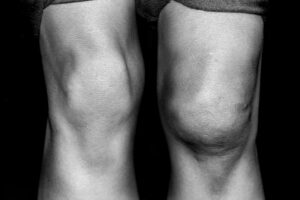Many individuals with diabetes may experience knee pain and swelling, which can significantly affect their quality of life. In this comprehensive guide, we’ll explore the causes of knee issues in diabetes and provide practical insights and effective diabetes knee pain swelling treatments to alleviate symptoms. Whether you’re newly diagnosed or have been managing diabetes for years, this blog aims to empower you with valuable information to help you take control of your knee health.
Contents
Can Diabetes Cause Knee Pain And Swelling?
 Yes, diabetes can contribute to knee pain and swelling. While diabetes primarily affects blood sugar levels, it can also have secondary effects on various parts of the body, including the joints. Here are several ways in which diabetes may be linked to knee pain and swelling:
Yes, diabetes can contribute to knee pain and swelling. While diabetes primarily affects blood sugar levels, it can also have secondary effects on various parts of the body, including the joints. Here are several ways in which diabetes may be linked to knee pain and swelling:
- Inflammation: Diabetes is associated with chronic inflammation throughout the body. This inflammation can affect the joints, leading to pain and swelling.
- Peripheral Neuropathy: Diabetes can cause peripheral neuropathy. This is damage to the nerves outside the brain and spinal cord. When nerves controlling the muscles around the knee are affected, it can result in weakness, instability, and pain.
- Joint Problems: Diabetes may contribute to joint problems such as osteoarthritis. Osteoarthritis is a degenerative joint disease that commonly affects the knees, causing pain and swelling.
- Compromised Blood Flow: Diabetes can impact blood circulation, affecting the delivery of nutrients and oxygen to various tissues, including the joints. Insufficient blood flow can contribute to joint damage and inflammation.
- Obesity: People with diabetes often have a higher risk of obesity. It is a significant risk factor for knee pain and swelling. Excess body weight puts additional stress on the knee joints, increasing the likelihood of conditions like osteoarthritis.
- Glycation: Elevated blood sugar levels in diabetes can lead to a process called glycation, where sugar molecules attach to proteins, forming substances that can cause damage to joint tissues.
People with diabetes need to monitor and manage their blood sugar levels effectively, maintain a healthy lifestyle, and seek medical advice if they experience persistent knee pain and swelling. Consulting with healthcare professionals can help in determining the specific cause of knee issues and developing a suitable treatment plan.
What Are Some Diabetes Knee Pain Swelling Treatments?
Diabetes knee pain swelling treatments involve a combination of lifestyle modifications, medical interventions, and self-care practices. Here are various treatments that can help alleviate diabetes-related knee pain and swelling:
Blood Sugar Management
Proper management of blood sugar levels is crucial in addressing diabetes-related knee pain and swelling. Consistent monitoring, adherence to prescribed medications, and a well-balanced diet can help stabilize blood sugar levels. Elevated blood sugar contributes to inflammation, which can exacerbate joint issues. By maintaining optimal blood glucose control, individuals can mitigate the inflammatory response and support overall joint health.
Medications
Nonsteroidal anti-inflammatory drugs (NSAIDs) are commonly prescribed to alleviate pain and reduce inflammation associated with knee problems in diabetes. These medications can provide relief from discomfort, making it easier for individuals to engage in physical activities and adhere to exercise regimens. Analgesics, or pain relievers, may also be recommended for managing pain symptoms. It is essential to consult with a healthcare professional to determine the most appropriate medication based on individual health conditions.
Physical Therapy
Physical therapy plays a pivotal role in managing diabetes-related knee pain and swelling. A physical therapist can design a tailored exercise program focusing on strengthening the muscles surrounding the knee joint. These exercises not only enhance joint stability but also improve flexibility and overall mobility. Regular physical therapy sessions empower individuals to actively participate in their recovery and promote long-term joint health.
Weight Management
Maintaining a healthy weight is integral to reducing stress on the knee joints. Excess body weight places additional strain on the knees, exacerbating conditions like osteoarthritis. Weight loss through a combination of dietary changes and regular exercise can significantly alleviate pressure on the knees, leading to a reduction in pain and swelling. Consultation with a healthcare professional or a nutritionist can help develop a personalized weight management plan.
Low-Impact Exercise
 Engaging in low-impact exercises is beneficial for individuals with diabetes experiencing knee issues. Activities such as swimming, cycling, or using an elliptical machine provide cardiovascular benefits without subjecting the knees to excessive stress. Low-impact exercises promote joint mobility, reduce inflammation, and contribute to overall physical well-being. Before starting any exercise routine, it is advisable to consult with a healthcare provider to ensure suitability based on individual health conditions.
Engaging in low-impact exercises is beneficial for individuals with diabetes experiencing knee issues. Activities such as swimming, cycling, or using an elliptical machine provide cardiovascular benefits without subjecting the knees to excessive stress. Low-impact exercises promote joint mobility, reduce inflammation, and contribute to overall physical well-being. Before starting any exercise routine, it is advisable to consult with a healthcare provider to ensure suitability based on individual health conditions.
Joint Injections
In cases of persistent knee pain and swelling, healthcare providers may recommend intra-articular injections. Corticosteroids or hyaluronic acid injections can be administered to the affected knee joint to reduce inflammation and provide relief. These injections aim to alleviate symptoms and improve joint function. While they can be effective, the decision to undergo joint injections should be made in consultation with a healthcare professional who will assess the individual’s overall health and specific condition.
Orthopedic Support
In addition to medical interventions, orthopedic support in the form of braces or supportive devices can be beneficial for managing knee pain and swelling. These aids help stabilize the knee joint, reduce strain during movement, and provide additional support. Orthopedic specialists can recommend and customize these devices based on the specific needs and conditions of the individual. Using such support can enhance mobility and contribute to the overall comfort of individuals dealing with diabetes-related knee issues.
Hot and Cold Therapy
Heat packs and cold compresses are valuable tools in managing knee pain and swelling. Applying heat helps to increase blood flow, relax muscles, and reduce stiffness. Cold therapy, on the other hand, can help alleviate inflammation and numb pain. Alternating between hot and cold treatments can provide a synergistic effect, offering relief from symptoms. It’s essential to use these therapies cautiously, following guidelines, and consulting with healthcare professionals to determine the most suitable approach for individual circumstances.
Compression and Elevation
Compression sleeves or wraps are commonly used to reduce swelling in the knee joint. These aids apply gentle pressure, helping to prevent the buildup of excess fluid. Additionally, elevating the affected leg when resting can promote drainage and reduce swelling. Compression and elevation are simple yet effective self-care practices that individuals can incorporate into their daily routine to manage knee symptoms. Consultation with healthcare providers can guide individuals on the proper use of compression and elevation techniques.
Hydration
Maintaining adequate hydration is crucial for overall joint health. Proper hydration helps ensure the lubrication of joints, reducing friction and enhancing their function. It also supports the transport of nutrients to joint tissues. Individuals with diabetes should make a conscious effort to stay well-hydrated as part of their comprehensive approach to managing knee pain and swelling.
Healthy Diet
Adopting an anti-inflammatory diet is essential for managing knee pain and swelling associated with diabetes. A diet rich in fruits, vegetables, whole grains, and omega-3 fatty acids can help reduce inflammation in the body. Limiting the intake of processed foods, refined sugars, and unhealthy fats is equally important. Consultation with a nutritionist or dietitian can aid in creating a personalized dietary plan that supports joint health and overall well-being.
Incorporating these measures into a holistic treatment plan, tailored to individual needs, can contribute to effective management and improved quality of life for individuals dealing with diabetes-related knee pain and swelling. Regular communication with healthcare professionals ensures ongoing support and adjustments to the treatment plan as needed.
Which Food Is Not Good For Diabetes Knee Pain Swelling Treatments?
 When managing diabetes knee pain swelling, it’s important to be mindful of dietary choices that may exacerbate inflammation and contribute to overall discomfort. While individual responses to specific foods can vary, here are some types of food that individuals with diabetes and knee issues may consider limiting or avoiding:
When managing diabetes knee pain swelling, it’s important to be mindful of dietary choices that may exacerbate inflammation and contribute to overall discomfort. While individual responses to specific foods can vary, here are some types of food that individuals with diabetes and knee issues may consider limiting or avoiding:
- Processed Foods
Highly processed foods often contain trans fats, refined sugars, and additives that can contribute to inflammation. Items like packaged snacks, sugary cereals, and pre-packaged meals should be consumed sparingly.
- Sugary Beverages
Sugary drinks, such as sodas and fruit juices, can lead to spikes in blood sugar levels. High sugar intake has been linked to increased inflammation, which may worsen knee pain and swelling.
- Refined Carbohydrates
Foods made with refined carbohydrates, such as white bread, white rice, and sugary cereals, can cause rapid spikes in blood sugar levels. Opt for whole grains and complex carbohydrates to promote stable blood sugar levels.
- Highly Processed Meats
Processed meats like hot dogs, sausages, and certain deli meats often contain additives and preservatives. These additives may contribute to inflammation, and the high saturated fat content in some processed meats can be detrimental to joint health.
- Excessive Red Meat
While lean cuts of red meat can be part of a balanced diet, excessive consumption may contribute to inflammation. Opt for lean protein sources like poultry, fish, and plant-based alternatives more frequently.
- High-Sodium Foods
Foods high in sodium can lead to water retention and swelling, potentially aggravating knee issues. Processed foods, canned soups, and certain condiments are common sources of excessive sodium.
- Certain Dairy Products
Full-fat dairy products may contribute to inflammation due to their saturated fat content. Choosing low-fat or fat-free dairy options can be a healthier alternative.
- Alcohol
While moderate alcohol consumption may not be harmful for everyone, excessive alcohol intake can contribute to inflammation and may interact with certain medications used to manage diabetes and associated conditions.
Make sure to connect with healthcare professionals, including dietitians or nutritionists, to create a personalized dietary plan that aligns with their overall health goals. Additionally, maintaining a balanced diet with a variety of nutrient-rich foods is essential.
Conclusion
In conclusion, diabetes knee pain swelling treatments require a multifaceted approach that encompasses lifestyle adjustments, medical interventions, and self-care practices. By maintaining stable blood sugar levels, engaging in targeted exercises, and making informed dietary choices, individuals can take proactive steps toward alleviating discomfort and promoting overall joint health. Thus, seeking personalized guidance ensures that individuals can navigate the challenges of diabetes-related knee issues effectively.
Ultimately, empowers people with diabetes to lead a healthier and more active life. Remember, each person’s journey is unique. Hence, by combining these strategies, one can find a tailored approach that suits their specific needs and enhances their overall well-being.
Do you want to get rid of diabetes? Join our online diabetes treatment program and reverse Diabetes naturally through lifestyle changes such as a Personalized Diet plan, Exercise, Yoga, dieticians, and health coaches.

